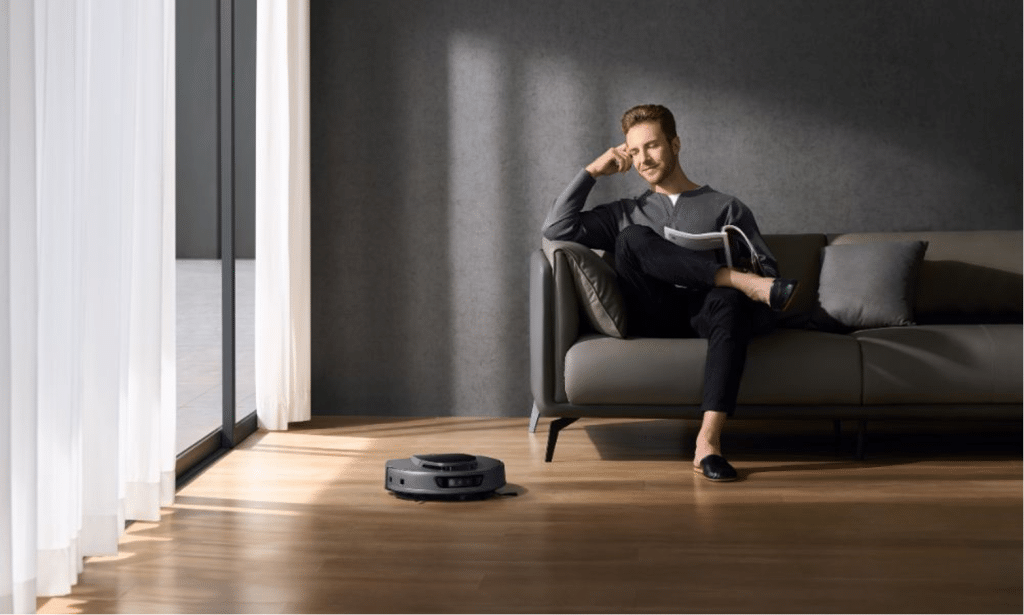With the rise of smart home technology, robot vacuums have become a staple in many households. While these devices are designed to make cleaning easier, their impact on daily routines, particularly sleep, is often overlooked. In this article, we’ll explore how quiet robot vacuums are revolutionizing home cleaning by offering a quieter, less disruptive solution that enables peaceful, undisturbed sleep.
Why do Noise Levels Matter for Sleep Quality?
Sleep is essential for good health, and quality sleep is directly influenced by the environment. High noise levels, especially during the night, can disrupt sleep cycles, leading to poor rest and diminished energy the following day. Studies have shown that noise, whether from traffic, household appliances, or other sources, can increase cortisol levels (the stress hormone) and disturb the body’s natural sleep rhythm. Robot vacuums that operate quietly have the potential to mitigate these disturbances, especially for light sleepers or those with irregular schedules.
Traditional Vacuums and Their Impact on Sleep
Conventional vacuum cleaners, including vacuum and carpet cleaner models, are typically noisy and intrusive, making them unsuitable for cleaning when family members are sleeping. This noise can range from 60 to 85 decibels, comparable to the sound of a dishwasher or city traffic. In contrast, self-emptying robot vacuums, while still producing noise, generally operate at much lower decibel levels. Their ability to work quietly during late hours or early mornings helps avoid sleep disruptions, allowing families to maintain cleaner homes without sacrificing sleep quality.
The Rise of Quiet Robot Vacuums: What Makes Them Different?
Advancements in technology have allowed for the development of quiet robot vacuum cleaners that perform well without generating disruptive noise. Key features that contribute to their quieter operation include:
- Brushless Motors: These motors eliminate friction, reducing noise while maintaining suction power. Brushless motors are typically quieter than traditional brushed motors, making them ideal for noise-sensitive environments.
- Noise-Dampening Materials: Quiet robot vacuums incorporate special materials within their build to absorb vibrations and sound. High-density foam and other vibration-absorbing composites help minimize noise during operation, making the vacuum less disruptive.
- Intelligent Suction Adjustment: Some advanced robot vacuums use AI technology to adjust suction levels based on the cleaning task. These vacuums can operate at lower power during quieter hours, reducing the sound emitted while still effectively cleaning.
How Quiet Robot Vacuums Can Improve Sleep Quality?
Quiet robot vacuums are more than just convenient tools for cleaning—they are transforming the way we think about home maintenance, particularly when it comes to sleep. Here’s how:
Less Disturbance During Late-Night or Early-Morning Cleanings
Many people prefer to run their robot vacuums at night while they sleep or early in the morning before they get out of bed. Quiet models can clean without waking up family members, ensuring that your home stays tidy without disturbing anyone’s rest.
Improved Sleep Environment
By reducing the noise caused by traditional vacuums or other household cleaning methods, quiet robot vacuums help maintain a peaceful environment that promotes relaxation. For individuals who live in shared spaces or have young children, a quiet robot vacuum can create an ideal atmosphere for sleep.
Enhanced Sleep for Light Sleepers
Light sleepers, in particular, benefit from quiet technology in robot vacuums. Even low levels of noise can wake someone up if they are sensitive to sounds. With the low decibel levels of modern robot vacuums, light sleepers can rest assured that their cleaning robot will not disturb their slumber.
No Need for Manual Intervention
Quiet robot vacuums can be scheduled to run at any time of day or night without the need for manual intervention. This flexibility allows for automatic cleaning without the hassle of moving furniture or interrupting one’s routine to vacuum, which can often be a source of noise disruption.
Recommended Quiet Robot Vacuums for Better Sleep
For those looking to incorporate a quiet robot vacuum into their home cleaning routine without disturbing their sleep, here are a couple of options:
1. 3i S10 Ultra
The 3i S10 Ultra offers a 13,000 Pa suction power while maintaining a low noise level. Thanks to its LIDAR navigation, it operates efficiently, avoiding obstacles and minimizing unnecessary noise. Its anti-tangle design and self-emptying dustbin further ensure smooth, quiet operation.
2. 3i G10+
The 3i G10+ is another excellent option, delivering 18,000 Pa suction while keeping noise levels to a minimum. It features AI-driven obstacle avoidance and dual-roller mops, offering powerful performance without disturbing peace. Its mechanical dustbin compression system further ensures quiet operation, even during self-emptying.
The Future of Quiet Robot Vacuums and Sleep
As demand for quieter home appliances continues to rise, manufacturers are likely to further improve robot vacuum technology. Future models may include even more advanced AI noise regulation, where vacuums adjust their sound based on the environment, ensuring minimal disturbance at any time. Additionally, energy-efficient motors and smart scheduling will make it easier to run vacuums during off-peak hours without sacrificing cleaning performance or sleep quality.
Conclusion
The impact of quiet robot vacuums on sleep is clear: they allow for efficient home cleaning without disturbing the peace. Whether it’s running your vacuum at night or early in the morning, quiet vacuums offer a perfect solution for light sleepers and families who want a cleaner home without sacrificing sleep. As technology advances, we can expect even quieter, more efficient models that can seamlessly integrate into our daily routines while helping us maintain both cleanliness and good sleep hygiene.
